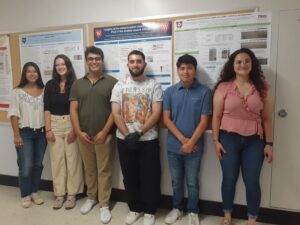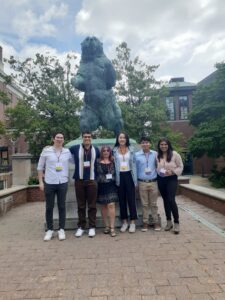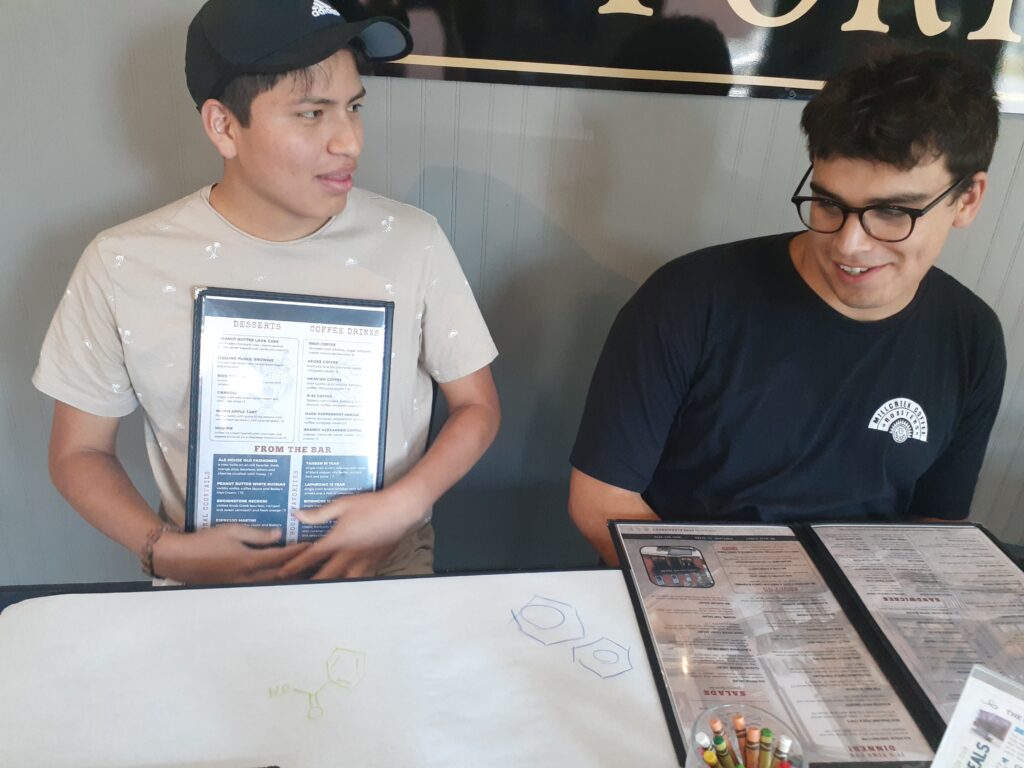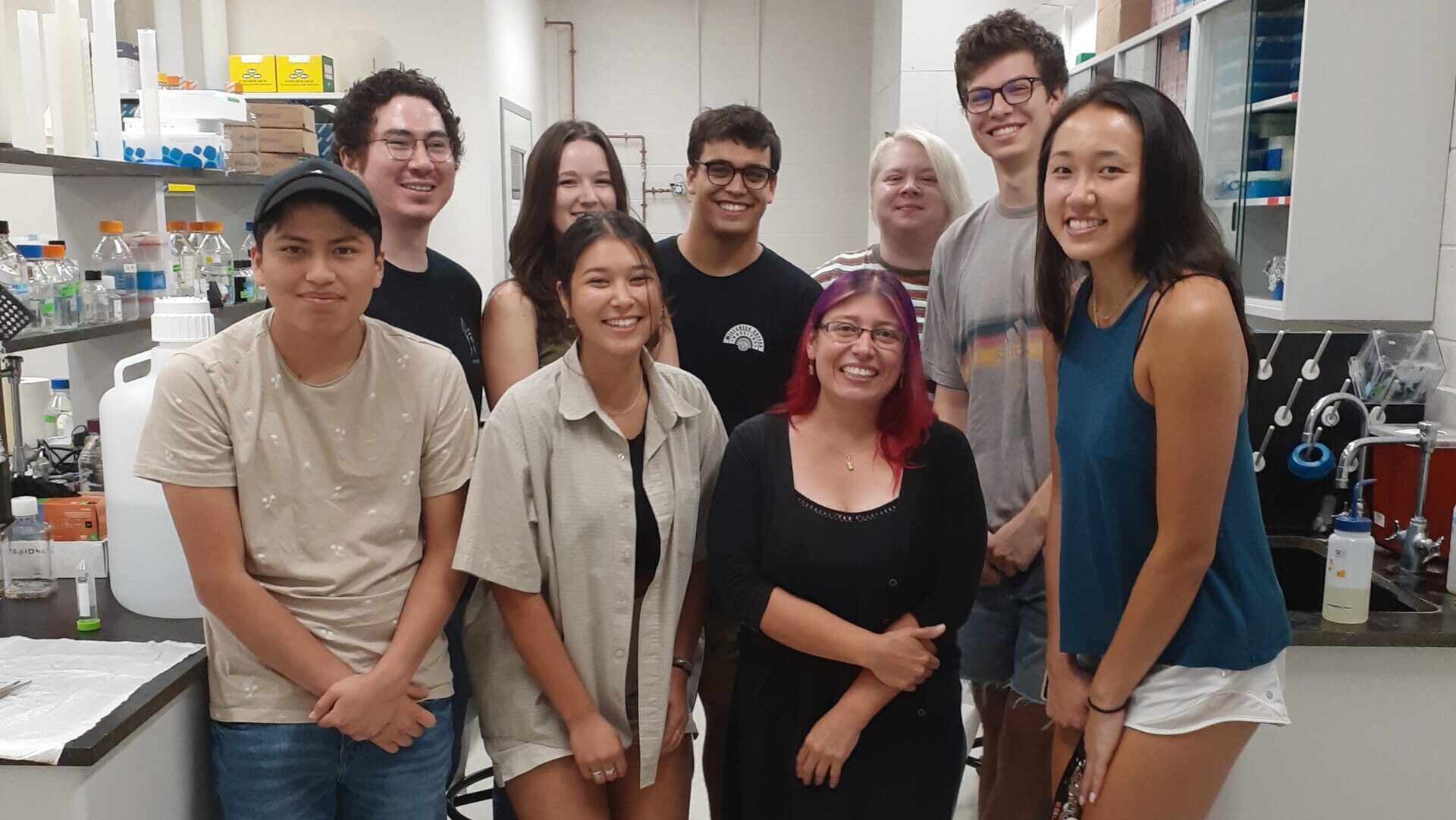Fa’alataitaua Fitisemanu ’24, a molecular biology and biochemistry (MB&B) and chemistry double major, knew he wanted to conduct research on campus and set about making it happen. After reaching out to Professor Teresita Padilla-Benavides, he joined her lab during his sophomore year to coincide with his participation in the Ronald E. McNair Post-Baccalaureate Program, a fellowship which aims to support students from under-represented backgrounds throughout their college education in preparation for graduate study.
“I think that you don’t really understand the value of doing research until you do it,” Fitisemanu said. “I came into the lab just being like, ‘I want to try it out.’ Then I really fell in love with it. Within the first few months of me joining the lab, I pushed to get my own project and get going and really, really fell in love with all of it.”

Fitisemanu belongs to a lab team which studies transition metal binding proteins, and he even stayed on campus this past summer to conduct research.
“He’s an excellent example of a committed, outstanding young scientist,” Padilla-Benavides said. “He understands that the lab work is very demanding. And he’s here happily and is willingly putting his time on our projects.”
From learning the ropes to spearheading his own projects in the lab to building a science community and attending conferences, Fitisemanu finds immense value in research and views lab work as a chance to learn and grow as much as he can. He even joined the Society for the Advancement of Chicanos/Hispanics and Native Americans in Science (SACNAS) through Padilla-Benavides, who serves as the faculty advisor to the group. Fitisemanu, who is Samoan, initially worried about feeling out of place, but he quickly found a welcoming community of scientists working to support each other in their professional endeavors.
In fact, being involved with SACNAS has opened up a whole other world of science to Fitisemanu, who presented his summer research at SACNAS’s National Diversity in STEM Conference in Puerto Rico at the end of October, a trip which was funded by the McNair Fellowship. Fitisemanu recalls feeling awed at his experiences throughout the conference.
“Going into SACNAS, everybody was the real deal,” Fitisemanu said. “A bunch of different underrepresented scientists were there showing their work from all sorts of different institutions. I got to go watch talks from faculty discussing their research with Native American reservation universities, which is super cool to talk about. I even got to meet a native Hawaiian professor who’s doing cancer work right now. I got to have a really nice conversation afterwards with her about getting more involved with Pacific Islanders and in science.”

Fitisemanu, who recalled feeling overwhelmed at the start, ended up loving the chance to speak with other scientists and meet people from other institutions and organizations.
“I kind of had a fangirl moment where I was like, ‘The NIH is here!’ but then I had to muster up the courage to go talk to them,” Fitisemanu said. “There were all sorts of different people from different backgrounds there. For me, it was really nice because it’s kind of rare to see a lot of underrepresented people working in the sciences, which I think is why I gravitated to the lab I did, because Dr. Padilla-Benavides is from Mexico City, and it’s really nice to have a mentor like her.”
Padilla-Benavides underscored the benefit of students presenting research at such conferences.
“[A conference like SACNAS] is very important exposure,” Padilla-Benavides said. “For me, that’s the most important, but also you get the chance to work on your skills, speak your science, improve your communication and presentation skills.”
Fitisemanu first presented at the 23rd Molecular Biophysics Annual Retreat, held at Wadsworth Mansion in September. It was a comfortable first conference experience, Fitisemanu explained, since it mostly included Wesleyan faculty and students, with some scientists from the greater Connecticut area. Then, at SACNAS, Fitisemanu got to meet people from institutions around the country and make broader connections. He underscored the supportive environment that the conference fostered.
“SACNAS was really cool because it was this big name conference where you’re going and presenting your research and kind of sweating about it, but also on the flip side, there was a very cool undertone of everybody trying to help each other there,” Fitisemanu said. “It wasn’t like a competitive environment; everybody was really helping each other get to the next level or get to the next opportunity, which is super cool.”
He even won a poster award, which Fitisemanu himself admits he was not expecting. In fact, he didn’t even attend the award ceremony because he had an early flight the next day, and he only learned about the honor a week after the end of the conference.
“I was connecting with a lot of people I had talked to…then one of my judges on my poster added me on LinkedIn first,” Fitisemanu recalled. “He DM’d me and [said] ‘Congratulations on your award. I really enjoyed your work. You should look at a job at my company.’ …Then I had to scour the internet for the article posting all the awardees. So I didn’t find out until SACNAS had posted the article about all the winners, and then I had to scroll through and find my name.”
Fitisemanu is slated to present his lab research again in March at the American Society for Biochemistry and Molecular Biology (ASBMB) conference, to be held in Seattle. Then, in August, he will present at the American Chemical Society conference in San Francisco.
He reiterated how transformative his lab experiences at Wesleyan have been in opening up these opportunities for him.
“I came in scared because I had zero skills in the lab before I joined sophomore year,” Fitisemanu said. “I think that a lot of the faculty here at Wesleyan that does research really puts a lot of emphasis on skill development, too. You start with small things, and you learn more, and you learn more and get skills, and then you move on to a harder thing. If you keep going and stick with it, you’ll be doing full size experiments. A lot of what I presented on was the first big experiments I ever did.”
Scientific involvement at Wesleyan has given Fitisemanu a strong sense of community.

“A lot of the labs here at Wesleyan create this environment that’s very friendly. You’re learning a lot, and you’re working really hard,” Fitisemanu said. “It’s not as stressful as you would really imagine. It’s kind of fun and everybody’s working hard….A lot of my closest friends are people that I’ve worked with over the summer.”
Padilla-Benavides echoed the sentiment of building community through lab work.
“I like to mentor students, I like to give them my advice, I want to work with them,” Padilla-Benavides said. “I try to be available to them, to make them grow into this community so that they all help each other. I don’t like the competition style model that some labs have. I like them to grow together.”
In fact, through his work with Padilla-Benavides, Fitisemanu even helped author a paper titled “Oxidative Reactions Catalyzed by Hydrogen Peroxide Produced by Streptococcus pneumoniae and Other Streptococci Cause the Release and Degradation of Heme from Hemoglobin,” published December 15, 2022. Going forward, Fitisemanu plans to attend graduate school and pursue a PhD. He urged students interested in pursuing research at Wesleyan to advocate for themselves and their interests.
“If you’re interested in doing something, if you’re interested in going to a conference, if you’re interested in doing experiments, if you’re interested in joining a lab, just go out and ask and push for it,” Fitisemanu said. “It takes a lot of courage, but you learn how to do it better as you go along.”


